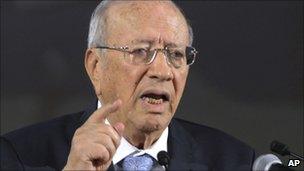Tunisia's interim government delays election
- Published

Mr Essebsi said the rest of the world was watching Tunisia and they had to get the vote right
Tunisia's interim government has said elections, due to be held in July, will be postponed for three months.
The Tunisian electoral commission had asked for the delay, saying it needed more time to prepare a credible vote.
The country's interim Prime Minister Beji Caid Essebsi said the vote will now take place on 23 October 2011.
Critics say that elections should go ahead soon to bring an end to the instability following the overthrow of President Zine al-Abidine Ben Ali.
But many recently formed political parties say they need more time to prepare.
Last month, the electoral commission sought a delay, saying that it needed more time to organise the vote, including putting three million Tunisians into the electoral database and ensuring hundreds of thousands of others get valid identity cards.
Reputation
"There are parties who did not agree, even the government did not agree, but our mission is to hold free and transparent elections," said Mr Essebsi, adding that Tunisia and its revolution "have a reputation that we must protect".
The date was the result of several weeks of negotiations between political groups to establish a date for the first election since the popular uprising which brought about the fall of Mr Ben Ali, forced to cede power on 14 January after 23 years in power.
Mr Essebsi said that Tunisia's fledgling experiment with democracy - which triggered a series of pro-democracy revolts across the Middle East - was being closely observed.
"The world is watching us. Tunisia today has an extraordinary image because its revolution happened peacefully, without weapons," he said, adding: "The wind of freedom has blown through other countries... but we will be the only ones to succeed in putting into place a democratic government."
October's vote is for a constituent assembly to write a new constitution that would pave the way for legislative and presidential elections.
The new assembly will decide whether the country gets a presidential or parliamentary system, and whether a separation of religion and state becomes law.
Under Mr Ben Ali's 23-year rule, a single party - now officially dissolved - controlled the country and opposition parties in parliament were largely symbolic.
Since his overthrow a total of some 81 new parties have been officially registered.